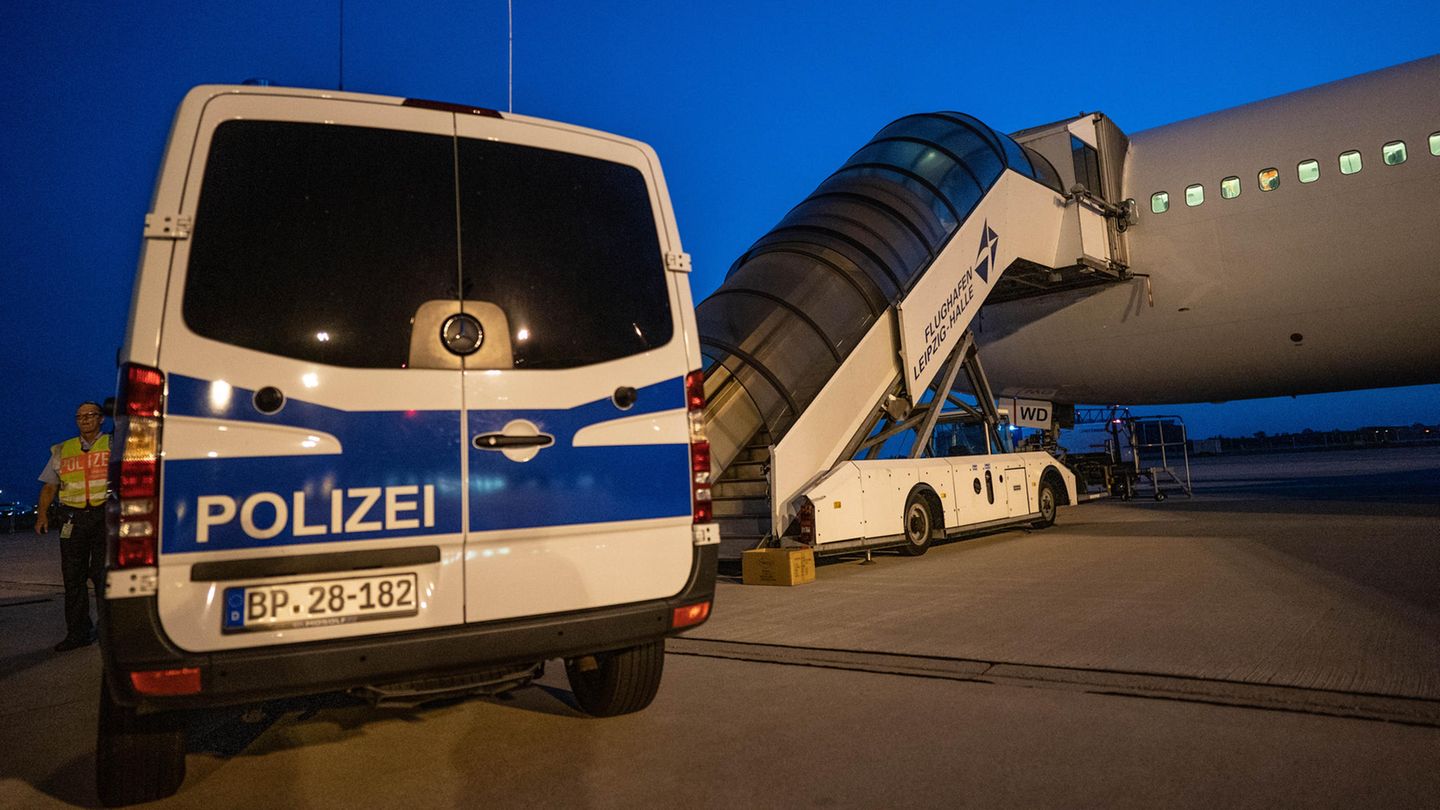There have been no deportations to Syria and Afghanistan in Germany for years. The incident in Solingen is now fuelling the debate about whether this should change.
The suspected perpetrator of the Solingen attack – a 26-year-old Syrian – should have been deported last year. But an attempt to deport him failed when officials did not find him in his accommodation. According to information from official sources, there were apparently no further attempts. NRW Interior Minister Herbert Reul (CDU) does not see himself as politically responsible for this. He referred to the North Rhine-Westphalian Ministry for Children, Youth, Family, Equality, Refugees and Integration and the responsible minister, Josefine Paul (Greens). “There are open questions that my colleague Paul is currently dealing with.” There are actually clear rules about how a deportation is carried out legally and practically.
What are the legal requirements?
If the Federal Office for Migration and Refugees (Bamf) has rejected an asylum application or the responsible immigration authority has decided that a person has no right to stay in Germany, the person concerned must be informed of this in writing. In most cases, the decision also includes a ban on re-entering and staying in Germany. The authorities also set a deadline for voluntary departure from Germany. Those affected can appeal against the decision within up to one month. If this deadline has expired – or if the appeal was unsuccessful – they face deportation.
If the rejected person does not leave voluntarily, the responsible authority issues a deportation order and informs the Central Deportation Office (ZAS) of the respective federal state. This office books the flights and informs the immigration authorities, state police and federal police about the details of the intended deportation. Previously, deportations were announced to those affected two to three days in advance, but this is no longer mandatory.
Why was the suspect from Solingen in Germany?
In accordance with the Dublin Agreement, the suspect should actually have been deported to the EU country he first entered: Bulgaria. He would have had to apply for asylum there. The German authorities did in fact try to deport the Syrian, but they apparently did not find him in his accommodation. And this shows another major problem: the states with EU external borders only take back a fraction of the refugees. In January 2024, for example, Germany asked other EU states to take back 6,141 refugees, of which 3,171 were approved. The number of actual transfers in that month: 482. The figures for the following months are similar.
How does a deportation take place?
Normally, the state police intervene in the early hours of the morning and get the people out of bed. They then take them to the airport or train station. In the case of a controlled departure, the police operation ends here. In the case of an accompanied deportation, the federal police take over and accompany the people by plane or train to the destination country. The passports of the people concerned are stamped “deported” and an entry ban is imposed. The authorities decide on the duration of this ban on a case-by-case basis. Sometimes people are deported individually, sometimes entire planes are chartered for collective deportations to a country.
Solingen
Attack at the folk festival – impressions from a city in shock
What happens if you resist deportation?
Normally, those affected are restrained during deportation, i.e. handcuffed or shackled. The authorities also use medication to sedate them on a case-by-case basis. The possibility of resistance is therefore at least limited.
Nevertheless, a letter from the state reception authority to the federal police made headlines, which literally stated: “If the person concerned refuses to board the plane or tries to resist deportation in another way (active/passive resistance), he or she can be released and travel independently back to the accommodation assigned to him or her.”
However, the statement then went on to say: “The document in question is an internal letter from the Lower Saxony State Reception Authority to the Federal Police, which is unfortunately worded in a very misleading and imprecise manner. It was not usually used in this form and will not be used at all from now on. The fact that it was sent to the Federal Police in this form is a regrettable isolated case.” The authority has no authority to give the Federal Police such an instruction. According to the press release, the letter was only intended to be a notice to the Federal Police that if a deportation fails, a court order must be in place for the person to be taken into custody.
Why do authorities have such a hard time with deportations?
The number of deportations from Germany rose to 21,206 last year, up from 18,094 in the previous year, according to the Federal Police’s annual report presented last week. A total of 4,776 people were pushed back at the border in 2023. However, significantly more was planned, namely the pushback or repatriation of a total of 52,976 people. According to the Interior Ministry, there were 11,102 deportations from January to July – although according to the Federal Office for Migration, 43,298 people were actually required to leave the country without a toleration permit.
To which countries is Germany not currently deporting people?
There is no fixed list of countries to which deportations are not carried out. However, as part of the asylum procedure, the BAMF checks whether there are so-called “destination-country-related deportation bans” that relate to dangers in the destination country. There was a deportation ban for the civil war-torn country of Syria from 2012 to 2020, but it was not extended. Nevertheless, no deportations to Syria have taken place since then. The same applies to Afghanistan since the Taliban took power in the country in 2021. There is no deportation ban, but in fact no deportations from Germany to Afghanistan take place.

What is the mood after the knife attack in Solingen?
03:00 min
Following the attack in Solingen, the political discussion about the assessment of the dangers to life and limb in Syria and Afghanistan is gaining momentum. However, the Bundestag’s Research Service has yet to comment: “Ultimately, it is always a case-by-case decision, but due to the desolate security situation and the precarious humanitarian situation in many places in Syria and Afghanistan, Article 3 of the ECHR is likely to regularly prevent any deportations to these states.” The article in question of the European Convention on Human Rights (ECHR) states: “No one shall be subjected to torture or to inhuman or degrading treatment or punishment.”
Why else do deportations fail?
There can be many reasons why deportations fail, such as illness or missing papers. Sometimes countries of origin refuse to take people back. Or the police cannot find the person concerned at the scheduled time. At the beginning of the year, the Bundestag passed a law tightening measure to address some of these problems. For example, the legal maximum duration of detention pending departure was extended from 10 days to 28 days. In addition, representatives of the authorities will now be allowed to enter rooms in shared accommodation other than just the room of the person being deported.
However, there is also a lack of places for deportation detention. Last year, arrest warrants were obtained in over 300 cases to ensure return or deportation, said Federal Police President Dieter Romann last week. “But all 800 places for deportation detention were full.”
Which countries are considered safe countries of origin?
In addition to all EU countries, this currently includes the following states:
- Albania
- Bosnia and Herzegovina
- Georgia
- Ghana
- Kosovo
- Macedonia, former Yugoslav Republic
- Montenegro
- Republic of Moldova
- Senegal
- Serbia
Sources:, , , “The expulsion of criminal refugees to Afghanistan and Syria in the light of international law” , , , .
Source: Stern
I have been working in the news industry for over 6 years, first as a reporter and now as an editor. I have covered politics extensively, and my work has appeared in major newspapers and online news outlets around the world. In addition to my writing, I also contribute regularly to 24 Hours World.




